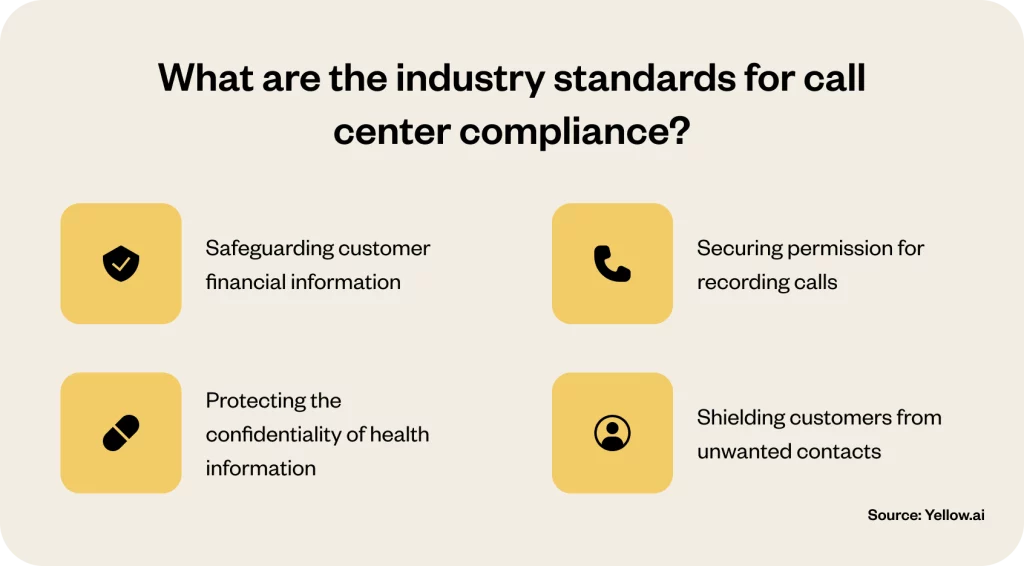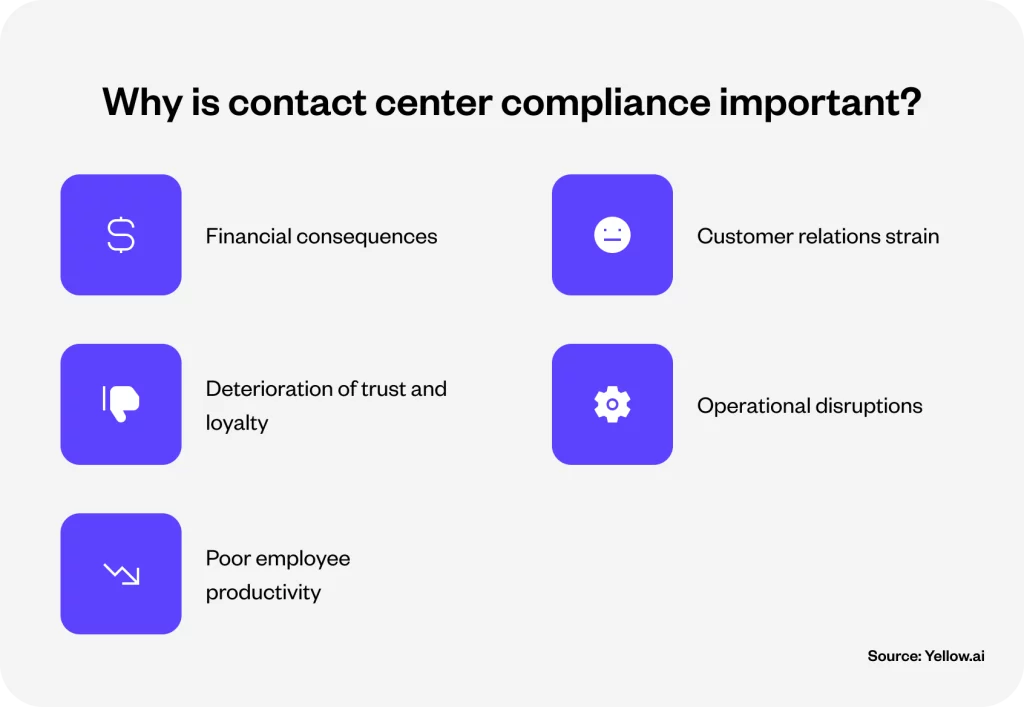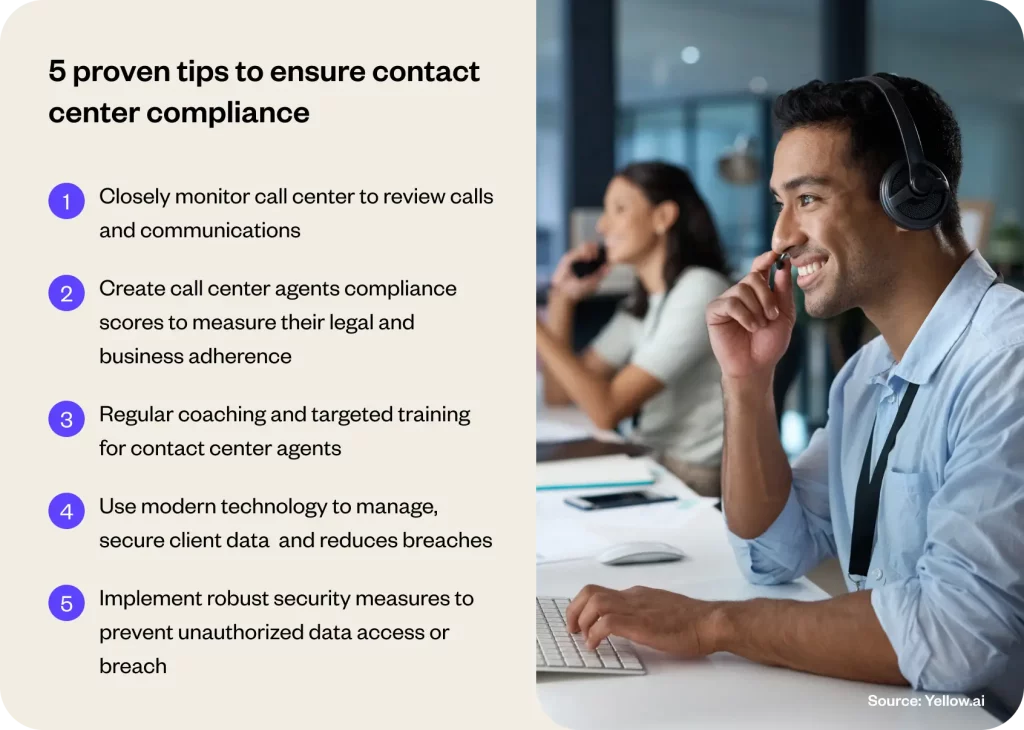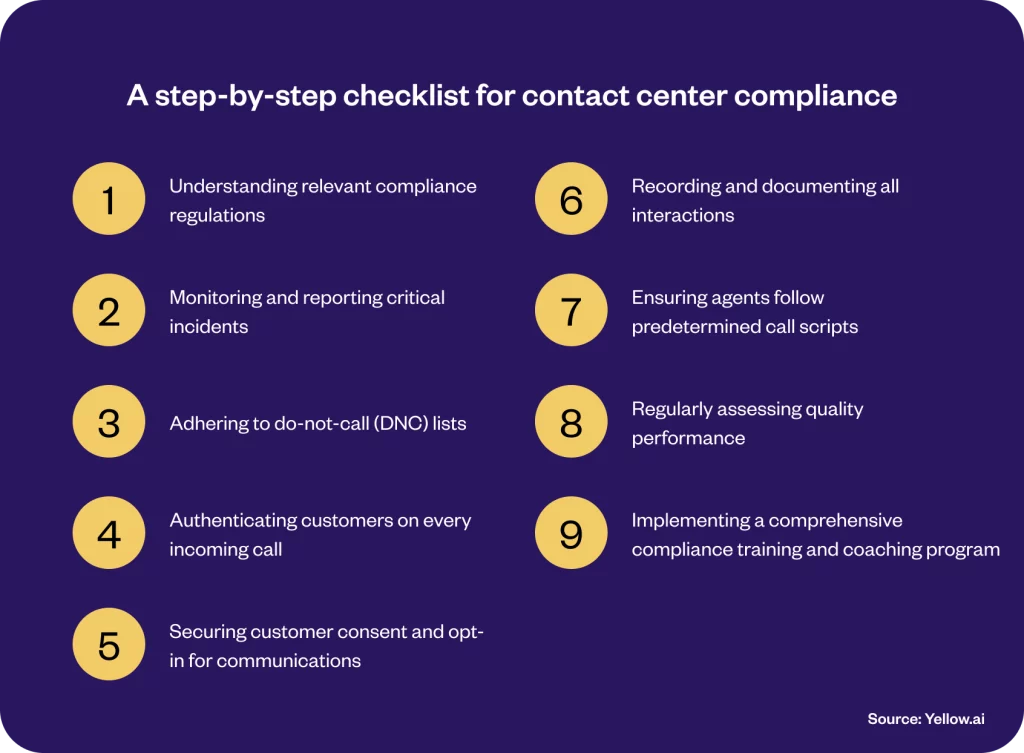Executive summary
Explore the critical role of compliance in modern contact centers with this insightful guide. Focusing on the essentials like importance, strategy, and a checklist, this blog equips businesses with the knowledge to navigate the complexities of call center regulatory compliance. It emphasizes the necessity for a robust compliance framework to protect customer data, uphold trust, and maintain seamless operations, ensuring businesses stay ahead in the competitive landscape.
In digital communication, contact center compliance is the linchpin for operational integrity and customer trust. It’s not merely about ticking boxes; it’s a strategic endeavor to safeguard sensitive information and foster robust customer relationships. As the digital landscape evolves, so do the challenges and standards of compliance, making it imperative for contact centers to stay vigilant and proactive.
Navigating the complexities of contact center compliance demands more than just legal savvy; it requires technological finesse. In this ever-evolving arena, AI and advanced analytics emerge as silent guardians, seamlessly integrating with compliance strategies to detect anomalies, automate data protection, and enhance customer interaction security. These technological allies streamline adherence to stringent regulations and also offer insights that refine service delivery, making compliance a dynamic element of business success. Their role in fortifying the foundations of trust and efficiency in contact centers is becoming increasingly indispensable, marking a new era where technology and compliance converge to create unparalleled customer experiences.
Related must-reads:
- Top 10 contact center automation trends for 2024
- Contact Center as a Service (CCaaS) – Features and benefits
- Contact center experience: Types + Ways to improve
What is call center compliance?
Call center compliance is the rigorous adherence to laws, regulations, and standards that govern how contact centers operate and interact with customers. It’s about ensuring that every aspect of the contact center’s operations, from data handling to customer interactions, aligns with legal requirements and ethical standards. This commitment protects customer data, upholds privacy, and maintains the integrity of the communication process.
At its core, compliance in the call center environment is shaped by a complex web of regulations that vary by region, industry, and even individual organizational policies. For businesses, this means navigating a dynamic landscape where rules can change based on new legislative trends, technological advancements, or shifts in consumer expectations. The challenge lies in maintaining operational efficiency and customer satisfaction while strictly adhering to these evolving standards.
For businesses, call center compliance isn’t just a legal checkpoint; it’s a critical component of their reputation and operational health. Non-compliance can lead to severe financial penalties, damage to customer trust, and long-term brand erosion. In today’s digital age, where customer interactions are increasingly scrutinized, a robust compliance strategy becomes a cornerstone of sustainable business practice, ensuring that every customer engagement is secure, respectful, and within the bounds of the law.
What are the industry standards for call center compliance?
Understanding industry standards for call center compliance is crucial for businesses to navigate the regulatory landscape effectively and maintain customer trust. These standards serve as the bedrock for ethical and lawful operations, ensuring that customer interactions are handled with the utmost care and respect for privacy.

Related read: 31 Call center metrics and KPIs to enhance the CX
1. Safeguarding customer financial information
A key standard in call center compliance is protecting customer financial information The Payment Card Industry Data Security Standard (PCI DSS) mandates that call centers must not store sensitive cardholder details, such as CVV2 numbers, PINs, or full magnetic stripe information. Adherence to PCI DSS helps minimize the risk of data breaches and financial fraud, ensuring that customer financial data remains secure throughout every interaction.
2. Securing permission for recording calls
Consent is paramount in call center operations, especially when it comes to recording calls. Automated messages often inform customers that their ‘calls may be recorded for quality and training purposes’. This practice ensures transparency and obtains the customer’s implicit consent for the recording, aligning with legal requirements and reinforcing trust in the company’s commitment to ethical communication.
3. Protecting the confidentiality of health information
Ensuring health information privacy is a paramount concern for contact centers engaged in the health sector. Adhering to the Health Insurance Portability and Accountability Act (HIPAA) is essential for these centers operating within the United States. This legislation acts as a bulwark to secure patient data, obstructing any unauthorized release and guaranteeing that sensitive health information is managed with the utmost confidentiality and integrity. Adhering to HIPAA fortifies customer confidence and is also crucial to sidestep potential legal challenges, underscoring its significance in the contact center domain.
4. Shielding customers from unwanted contacts
Respecting customer preferences and protecting them from unsolicited contacts is another crucial aspect of call center compliance. Regulations like the Telephone Consumer Protection Act (TCPA) in the U.S. set clear guidelines for telemarketing and automated calls, ensuring customers are not disturbed by unwanted communications. Adherence to these standards not only fulfills legal obligations but also enhances customer satisfaction and loyalty by respecting their communication preferences.
Why is contact center compliance important?
Businesses must know the importance of contact center compliance to ensure they operate within legal boundaries and preserve customer trust. Compliance is not just a regulatory requirement; it’s a foundational element that impacts various aspects of business operations.

1. Financial consequences
Non-compliance in contact centers can lead to hefty fines and penalties, significantly affecting a company’s financial health. Regulatory bodies impose these fines to enforce adherence to established standards. Failing to comply can result in costs beyond monetary penalties, including legal fees and settlement expenses. For businesses, ensuring compliance is not just about avoiding penalties but also about safeguarding financial stability and future viability.
2. Customer relations strain
Compliance directly impacts customer trust and relationships. Customers expect their interactions with contact centers to be secure and their data to be handled responsibly. Any lapse in compliance can lead to customer dismay and strain relationships, making it harder for businesses to retain loyal customers and attract new ones. Upholding strict compliance standards helps in reinforcing customer confidence and nurturing long-term relationships.
Related read: Customer retention: 15 strategies to improve CS
3. Deterioration of trust and loyalty
Trust is the foundation of customer loyalty; compliance leaks can rapidly erode this trust. Once lost, it’s challenging and often costly to rebuild. Compliance breaches, particularly those that compromise customer data, can lead to a loss of trust, affecting customer retention and loyalty. Businesses need to prioritize compliance to maintain and strengthen customers’ trust in their brand.
4. Operational disruptions
Compliance violations can lead to operational disruptions, affecting the smooth functioning of contact centers. From legal battles to the need for implementing corrective measures, non-compliance can divert resources from core business activities, leading to inefficiency and potential loss of service quality. Maintaining compliance helps ensure operational continuity and prevents disruptions that can impact service delivery and customer satisfaction.
5. Poor employee productivity
Ensuring a compliant environment is pivotal for nurturing employee morale and productivity. When staff operate within a framework that aligns with ethical standards and legal mandates, it cultivates a sense of integrity and trust. The presence of compliance discrepancies can precipitate a climate of uncertainty, potentially diminishing workforce efficiency and contributing to higher attrition rates. By steadfastly upholding compliance, businesses can foster a conducive work atmosphere, enabling employees to concentrate on excelling in customer service, free from the encumbrances of legal or ethical difficulties.
How do businesses ensure their contact centers are compliant?
Ensuring compliance in contact centers is a multifaceted process involving monitoring, training, technology, and stringent security measures. Businesses must adopt comprehensive strategies to meet regulatory standards and safeguard customer information effectively.

1. Call center monitoring
Monitoring the call center is a critical component of maintaining compliance. By systematically reviewing calls and communications, businesses can identify and rectify compliance gaps in real time. Advanced monitoring goes beyond traditional sampling methods, employing analytics to scrutinize all interactions. Thus, it reduces non-compliance risk and ensures a comprehensive understanding of agent performance and customer satisfaction.
Related read: Call center automation – Types, benefits and steps to implement
2. Creating a compliance score for call center agents
Developing a compliance scoring system for agents helps quantify their adherence to both legal requirements and company policies. This method involves evaluating interactions against a set of predefined criteria, allowing managers to pinpoint areas where agents excel and where they need further guidance or training. Such scoring reinforces compliance and promotes consistent and quality customer service.
Related read: AI agents: types, benefits, and examples
3. Agent coaching
Regular coaching sessions are essential for reinforcing compliance standards and best practices among call center agents. Through targeted training and feedback, agents become well-versed in the nuances of regulatory requirements and the organization’s expectations. This continuous learning environment encourages adherence to compliance protocols and enhances the overall quality of customer interactions.
Related read: The ultimate guide to customer service training
4. Using call center technology
Leveraging technology is key to achieving and maintaining compliance. Modern call centers utilize sophisticated software solutions that automate the redaction of sensitive information, monitor call quality, and ensure data security. These technologies facilitate compliance by providing tools that manage and protect customer data effectively, reducing the risk of breaches and non-compliance.
Related read: Call center software – A Complete Guide [2024]
5. Security measures
Implementing robust security measures is non-negotiable for compliance. These measures include encryption of sensitive data, restricted access to authorized personnel, and secure communication networks to prevent unauthorized data access or breaches. By fortifying their digital and physical infrastructures, businesses can create a secure environment that upholds compliance standards and protects customer information against potential threats.
A step-by-step checklist for contact center compliance
Contact centers must ensure compliance to maintain consumer confidence and meet regulatory mandates. Here’s a step-by-step checklist to guide businesses in maintaining compliance:

1. Understanding relevant compliance regulations
Firstly, businesses must fully understand the compliance regulations that apply to their operations. It means staying updated on laws like the TCPA, HIPAA, GDPR, and PCI DSS, which vary depending on the industry and the geographical location of the contact center. Knowledge of these regulations helps businesses tailor their compliance strategies effectively. Moreover, companies must proactively monitor periodic amendments in legislation to adapt their compliance measures accordingly, ensuring ongoing alignment with both international and local legal standards.
2. Monitoring and reporting critical incidents
Regular monitoring of all contact center activities is essential to identify and address potential compliance issues promptly. Businesses should establish a system that tracks, reports, and analyzes every interaction for compliance adherence. This system should not only capture deviations but also provide insights into the root causes of compliance lapses, facilitating targeted corrective actions. Implementing comprehensive monitoring tools and protocols ensures that businesses can maintain a high standard of compliance across all operations.
3. Adhering to do-not-call (DNC) lists
Adherence to DNC lists is a crucial aspect of compliance, reflecting respect for customer preferences and legal requirements. Businesses must ensure that their contact centers have access to up-to-date DNC lists and that their calling practices comply with them to avoid unsolicited communications. Regular training and auditing procedures should be in place to reinforce the importance of DNC list compliance, preventing potential legal issues and fostering customer trust.
4. Authenticating customers on every incoming call
Customer authentication on every call safeguards against fraud and data breaches, enhancing the overall security of customer interactions. Implementing robust authentication processes, such as caller ID verification and integration with customer relationship management (CRM) systems, ensures that customer information is accurately identified and securely accessed. It not only enhances compliance but also improves the customer experience by making service interactions more efficient and personalized.
5. Securing customer consent and opt-in for communications
Obtaining explicit customer consent before communication is crucial for compliance and ethical business practices. Businesses should have clear processes in place for securing and documenting customer consent, ensuring that all communications are legally sanctioned and welcomed by the customers. This step is fundamental in building a transparent and respectful relationship with customers, significantly reducing the risk of compliance violations and enhancing customer satisfaction.
6. Recording and documenting all interactions
Comprehensive recording and documentation of interactions are imperative for compliance, providing an audit trail that can be reviewed for adherence to regulations and internal policies. Businesses should ensure that all calls, chats, and other customer interactions are recorded and stored securely, with clear protocols for access and analysis. Besides aiding in compliance checks, it also serves as a valuable resource for training and quality assurance purposes.
7. Ensuring agents follow predetermined call scripts
Using pre-approved call scripts helps maintain compliance by guiding agents in their interactions with customers. These scripts should be regularly reviewed and updated to reflect current compliance requirements and best practices. Training agents to adhere to these scripts ensures consistency in communication, reduces the risk of non-compliance, and maintains a high standard of customer service.
Related read: Call center scripts- Examples, advantages and disadvantages
8. Regularly assessing quality performance
Ongoing assessment of service quality and compliance is vital to identify areas for improvement and ensure consistent adherence to standards. Regular performance reviews, combined with feedback and coaching, help agents understand compliance requirements and enhance their interaction skills. This continuous improvement cycle is crucial for maintaining a culture of compliance and service excellence in the contact center.
9. Implementing a comprehensive compliance training and coaching program
Finally, a structured training and coaching program is essential to equip agents with the necessary knowledge and skills for compliance. This program should cover all aspects of regulatory requirements, company policies, and ethical standards, ensuring that agents are well-prepared to manage customer interactions compliantly and effectively. Regular updates and refresher courses will keep the team current on compliance norms and best practices, reinforcing the importance of compliance in every aspect of contact center operations.
Streamline and strengthen contact center compliance with Yellow.ai
As your business navigates the complex landscape of contact center compliance, Yellow.ai emerges as a pivotal ally, streamlining and strengthening compliance processes with its cutting-edge technology. Yellow.ai’s advanced solutions are designed to integrate seamlessly into your compliance framework of contact centers, enhancing efficiency and reducing the manual burden on staff.
- Automated compliance monitoring: Yellow.ai’s advanced AI tools continuously monitor communications, ensuring adherence to regulatory standards and reducing the risk of non-compliance.
- Data security and privacy: Leveraging encryption and secure data management, Yellow.ai protects sensitive customer information, aligning with PCI DSS, GDPR, and other compliance mandates.
- Dynamic scripting for agents: The platform offers dynamic scripting tools that guide agents in real-time, ensuring that every customer interaction complies with regulatory requirements.
- Comprehensive analytics dashboard: With Yellow.ai, businesses gain access to detailed analytics and reporting features, providing insights into compliance performance and areas for improvement.
- Customizable compliance workflows: Create tailored workflows that align with specific compliance standards, ensuring that all operational aspects of the contact center meet regulatory demands.
To discover how Yellow.ai can transform your contact center compliance efforts, book a demo today and experience the convergence of technology and compliance in action.
The final thoughts
Looking ahead, the narrative of contact center compliance is rapidly evolving, influenced by technological advancements and changing regulatory landscapes. In this dynamic environment, businesses that leverage innovative solutions like Yellow.ai stay ahead in compliance and redefine customer service excellence.
By integrating intelligent automation and AI-driven insights, contact centers can proactively anticipate and adapt to compliance requirements, ensuring a seamless and secure customer experience. The journey toward comprehensive compliance is both a challenge and an opportunity to upgrade service standards, build tenacious customer trust, and secure a competitive edge in the marketplace. With Yellow.ai, the future of contact center compliance is not just about meeting standards but setting new benchmarks in customer service excellence and operational efficiency.






















